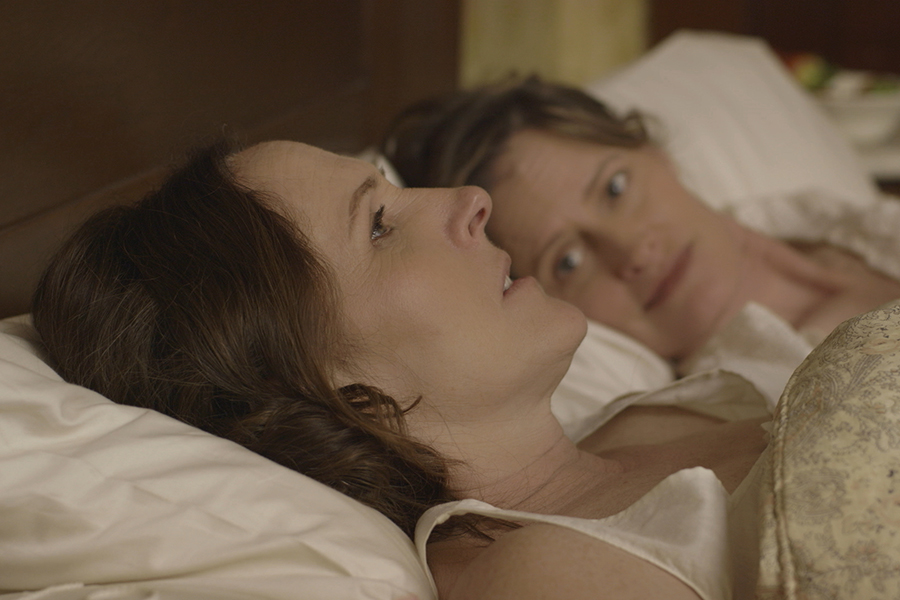“Wild Nights with Emily,” opening April 19 at the Landmark Ritz at the Bourse, is a comic look at the relationship between reclusive poet Emily Dickinson (Molly Shannon) and her lover and sister-in-law, Susan (Susan Ziegler), in 1860 Amherst.
The film opens with the two women kissing courteously before embracing far more passionately. Lesbian writer/director Madeleine Olnek — adapting her play — has an agenda to debunk the myth that Dickinson was (as an end title card indicates) “a half-cracked, unloved recluse who was afraid to publish her work.”
In working from this revisionist approach to Dickinson, Olnek’s PG-13 film is deliberately more mild than wild. But it does show Emily’s love affairs as well as her frustrations about not being able to achieve great(er) success as a poet in her lifetime.
Early on, the film flashes back 20 years to when Emily and Susan are teenagers (Dana Melanie and Sasha Frolova). These young women are seen falling in love, as Emily hopes to kiss Susan the way a young woman would kiss a man.
So begins their decades-long relationship, which is bolstered by sleepovers but also setbacks — as when Susan must travel for work. When Susan returns, the women’s affair hits a snag as Susan has become engaged to Emily’s brother, Austin (Kevin Seal).
Emily — whom, viewers are told — watches funeral as entertainment, is quite despondent. However, Susan acknowledges that she is moving next door so they can contrive ways of being together.
Some of the more romantic moments in the film have Susan looking out her window at Emily. And some comic moments that follow have Susan artfully rebuffing her husband, who is in bed, watching and waiting for her. In contrast, Emily produces a tinge of jealousy in Susan when Emily has an affair with widow Kate (Allison Lane).
While the film suggests Dickinson had a passionate love life, “Wild Nights with Emily” also emphasizes that the poet very much wanted to see her work in print. Alas, her efforts were stymied by men who did not understand its merits.
In one drolly amusing scene, Col. Thomas Wentworth Higginson (Brent Gelman), a pretentious editor from The Atlantic, offers revisions to Emily’s poems, removing lines of text and dashes, much to her chagrin. Another scene with a prospective publisher is met with awkward, noisy tea-slurping as a response.
The film identifies that Dickinson wrote 18,000 poems, only 11 of which were published in her lifetime.
The storyline is also framed by a lecture Mabel Todd (Amy Seimetz) gives to a women’s auxiliary club on her “friendship” with Dickinson.
However, the two women never actually met. Emily was often secluded in her room when Mabel visited her home and played the piano for her.
Moreover, Mabel was having an affair with Austin, who was cheating on Susan. As Mabel recounts Emily’s life in her lecture, she trades on gossip such as Emily embracing Judge Otis Phillips Lord (Al Sutton).
However, other scenes depict what may have really occurred. After the elderly Judge Lord prattles on, conflating “Wuthering Heights” and “Jane Eyre” — with Emily having politely inquired about his reading the Brontës — the elderly gentleman arises and loses his balance. As Emily assists him, it appears they are embracing.
Mabel’s half-truths also extend to how she considers her own husband, David Peck Todd (David Albiero). Upon mentioning him, a humorous aside suggests why she may have embarked on an affair with Austin.
Mabel, who published an edited collection of Dickinson’s work after the poet’s death, is the true villain of the piece, using Dickinson’s talent for her own fame. Mabel’s efforts at self-promotion lead to an end title card that informs viewers that, in 1998, spectrographic technologies proved that Susan’s name had been erased from Emily’s original letters.
As for Dickinson’s poems, Olnek uses them adroitly throughout the film, putting their text on screen as handwritten pages or in subtitles. The poet’s words often reflect her emotions, as when she expresses thoughts of pain in a difficult moment. There is enough of a sense of her work that literary enthusiasts will not feel slighted by a film where the cleverest joke involves Emily and Susan wanting to hear the celebrated Ralph Waldo Emerson.
“Wild Nights with Emily” uses a witty, comic tone to make its points known easily. Olnek’s (ir)reverence for Dickinson comes through as Shannon is often suppressing a smile, most notably during a scene of Emily handing Susan poems she has pulled out of her waist, locket and hair.
The central performances are pitch-perfect. Olnek coaxes marvelous turns from Shannon, who conveys Dickinson’s anxieties and passions; Ziegler, as her muse and champion; and Seimetz, as her posthumous editor and foil.
If this low-budget film does not have the spectacle of a lavish Merchant Ivory costume drama, Olnek is nevertheless quick with a gag about Dickinson always wearing the same dress.
“Wild Nights with Emily” is both funny and feminist revisionism.
